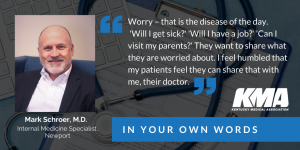As of April 6, the Kentucky Department for Public Health (KDPH) has confirmed 1,008 positive cases of COVID-19 and has tested 19,955 Kentuckians. The official KDPH COVID-19 webpage, available here, includes these updated totals as of 5pm ET each day. The site also contains a map of confirmed cases by county, as well as information on telehealth and donating personal protective equipment (PPE).
In Your Own Words: Mark Schroer, M.D.
KMA is sharing the first-person accounts of physicians from across the state as they prepare for and battle the COVID-19 pandemic. These stories will also be published at kyma.org/covid19. If you are interested in submitting an account, please email Emily Schott, schott@kyma.org.
KMA spoke to Mark Schroer, M.D., Internal Medicine Specialist, Newport, regarding his experience.
 As I walk to the office each morning it feels like the beginning of a bad detective novel. “The streets were quiet. Too quiet. I could tell something bad was about to happen.” Only this time a shot doesn’t “ring out” and the silence is real. Reality is often blunt and harsh and, in some ways, boring. The quiet in my town is all of that. The silence is unsettling. I don’t like it. I feel like the silence is urging me to do something. Or is the silence trying to teach me something. I don’t know. The media is calling health care workers heroes. Rightfully so. Shouldn’t I be doing something heroic? So what do I do? I wait and prepare.
As I walk to the office each morning it feels like the beginning of a bad detective novel. “The streets were quiet. Too quiet. I could tell something bad was about to happen.” Only this time a shot doesn’t “ring out” and the silence is real. Reality is often blunt and harsh and, in some ways, boring. The quiet in my town is all of that. The silence is unsettling. I don’t like it. I feel like the silence is urging me to do something. Or is the silence trying to teach me something. I don’t know. The media is calling health care workers heroes. Rightfully so. Shouldn’t I be doing something heroic? So what do I do? I wait and prepare.
COVID-19 hasn’t hit my community like others. The hospital census is low and everyone is staying inside. I’ve only treated one patient with COVID-19 and that was in a nursing home. Every morning I read the latest medical journal on MERS, SARS and SARS-COV-2. I even got out my old pharmacology textbook and studied the anti-viral drugs for AIDS. I’m not busy at the moment. I essentially closed my office for the first week of March. I saw maybe one or two acute patients a day. I thought the sooner we all stay home the sooner this will all be over. Then I noticed something. The office phone rang and rang and rang again. I opened the office back up. Because I discovered COVID-19 or no COVID-19 life goes on and people still need help. A man gashed his foot, gangrene settled in, and needed an amputation. A woman had the agonizing pain of cervical disc disease. Another had a wound dehiscence from a recent surgery. All the rest have “anxiety disorder.” Worry – that is the disease of the day. “Will I get sick?” “Will I have a job?” “Can I visit my parents?” They want to share what they are worried about. I feel humbled that my patients feel they can share that with me, their doctor. Some need their wounds bound but most just need comfort. It’s not much different from what I did in the “pre-epidemic era.” Listening. Reassuring. Comforting.
So I am not doing anything heroic. I’m not managing a vent or deciding on a dose of chloroquine. I’m continuing my work-a-day activities. I am still waiting and preparing for the onslaught I hope never comes. And as the silence urges me to do better, I realize that doing the best job I can as a doctor is heroic enough. That’s the great lesson from the silence I’ll take during the Great COVID-19 Epidemic.
Reminder: Online CME Activity Available on CARES Act and Families First Coronavirus Response Act
An online CME opportunity is now available from KMA and McBrayer, PLLC for physicians that provides a comprehensive explanation of the provisions of the CARES Act and the Families First Coronavirus Response Act. The activity details how these two new laws and guidance from the Centers for Medicare and Medicaid Services and the Department of Labor affect healthcare organizations as businesses, employers, and providers of healthcare and emergency response.
For more information and to complete the activity, click here.

